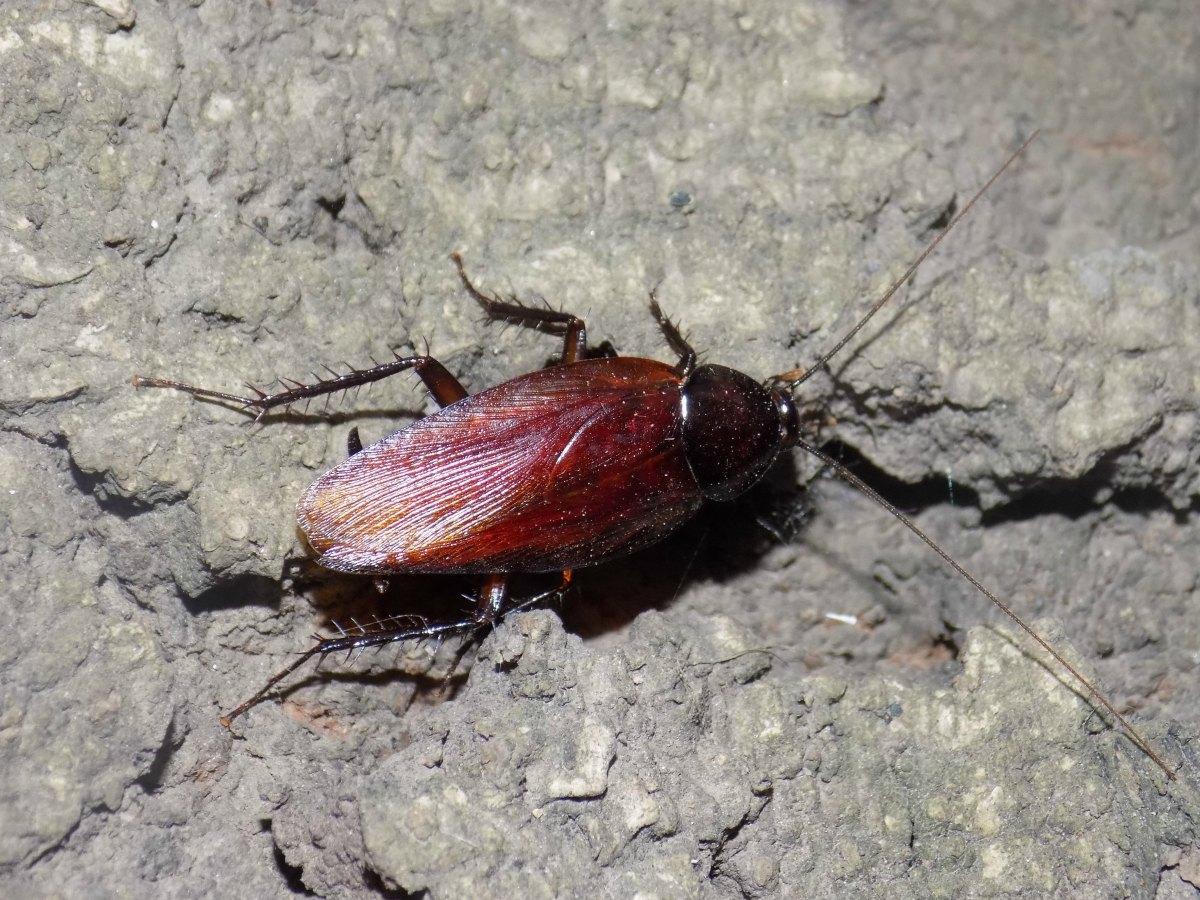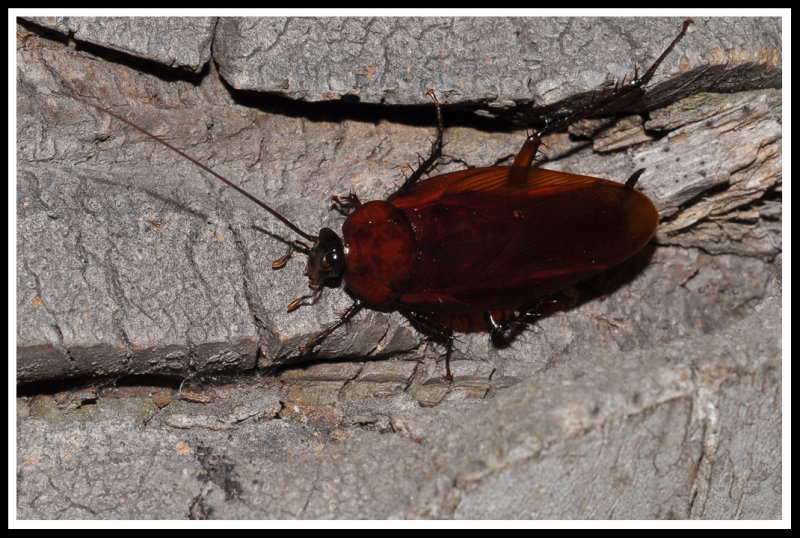
Dark Cockroach Ventral fuliginosa
The annual life cycle, and the seasonal and spatial changes in numbers and the age structure were investigated in a natural population of the smoky brown cockroach, Periplaneta fuliginosa S.

Maroon Cockroach Dorsal fuliginosa
Where Found Smoky-brown cockroaches require high humidity for survival. They are found outside in wooded areas that provide shade and moisture. They can also be seen in protected areas around homes (tree holes and mulch) and in buildings and attics. Stacks of lumber and firewood, sewer-access openings and trash piles can contribute to infestations.

cockroach fuliginosa
Superfamily Blattoidea Family Blattidae Genus Periplaneta Species fuliginosa (Smoky Brown Cockroach) Explanation of Names Periplaneta fuliginosa (Serville 1839) Identification unlike other Periplaneta spp. found in our area, has no pattern on pronotum.

INS01600119 Joel Sartore
Periplaneta fuliginosa. Identification Numbers. TSN: 666678. Geography. Launch Interactive Map. Working with others to conserve, protect and enhance fish, wildlife, plants and their habitats for the continuing benefit of the American people. Footer Menu - Employment. Careers & Internships;

fuliginosa Serville 1838 media Encyclopedia of Life
A close relative to the American cockroach, Smokybrown roaches ( Periplaneta fuliginosa) have many similar behavioral and visual characteristics. In the United States, you will find them in warmer climates and southern states such as Texas, Florida, Louisiana, Mississippi and Georgia. What do Smokybrown Cockroaches Look Like?

fuliginosa Serville 1838 media Encyclopedia of Life
Abstract Abstract The smokybrown cockroach, Periplaneta fuliginosa (Serville), has become an increasingly important peridomestic pest throughout much of the southeastern United States, Japan, and southeast Asia. We provide a brief description of the species and clarify its worldwide distribution.

Cockroach Ventral fuliginosa
Abstract. Aspects of the outdoor activity and distribution of the smokybrown cockroach, Periplaneta fuliginosa (Serville), were studied during a 14-day period in July 1984 in Houston, Tex. Daily trapping revealed an age-class distribution of 27.2% adults (260 females : 244 males) and 72.2% nymphs (630 small : 475 medium : 214 large). Trap-catch was significantly lower following rains and.

Maroon Cockroach Dorsal fuliginosa
The replicative form (RF) of the Periplaneta fuliginosa densovirus (PfDNV) genome was cloned and its complete nucleotide sequence was determined. The PfDNV genome is 5454 nucleotides (nt) in length with distal 201-nt long inverted terminal repeats (ITRs). The first 122 nt at the 5'-end and the termi.

Cucaracha Café Ahumada fuliginosa) EcoRegistros
smokybrown cockroachPeriplaneta fuliginosa) is a large species of cockroach, winged, and growing to a length of 32-35 millimetres (1.3-1.4 in). [1] Although closely related to the American cockroach Periplaneta americana ), the smokybrown cockroach is readily distinguishable from it by its uniformly light to dark brown- mahogany coloration. [1]

fuliginosa Wikispecies
Identification. P. americana (American Cockroach) is the most common Periplaneta in the US: P. australasiae (Australian Cockroach) has a more contrasting pronotal pattern and white bands on the outsides of the wings: P. fuliginosa (Smoky Brown Cockroach) has pronotum uniformly dark (no pattern): P. brunnea (Brown Cockroach) may be difficult to.

fuliginosa Serville 1838 media Encyclopedia of Life
Periplaneta fuliginosa Habitat Smokybrown cockroaches are prevalent in leaf litter, in and around shrubs, flowers and trees, tree holes, wood piles, garages, crawl spaces, attics, and greenhouses. It has also been found on roofs and in rain gutters feeding on bird droppings and plant materials. Smokybrown cockroaches can also survive in sewers.

smokybrown cockroach fuliginosa)
An infectious clone of the Periplaneta fuliginosa densovirus (PfDNV) has been constructed and the PfDNV genome can rescue from the plasmid and replicate as the wild-type virus in nymphs of P. fuliginosa. To investigate the ability of the cloned PfDNV genome to be used as a stable and persistent expression vector, we constructed seven.

Smokybrown Cockroach Facts, Identification and Pictures
Periplaneta fuliginosa densovirus (PfDNV) was purified from the diseased smoky-brown cockroach, one of the dominant cockroach species in China ( Hu et al., 1994 ).

fuliginosa
Belonging to the Periplaneta fuliginosa family, a Smokybrown cockroach is larger compared to other cockroaches and prefers to live outdoors. However, these pests can come indoors during the day in search of food. Some characteristics of these insects are: Smokybrown roaches can group up to a length of 32-35 millimeters (1.3-1.4 inches).

Giant cockroach fuliginosa
Periplaneta fuliginosa (smoky brown cockroach) is an introduced peridomestic species. It is common in the southern United States mostly found out of doors or in crawl spaces or unheated buildings such as outhouses or garages. Nor does it have pale areas on the forewings that distinguish. It reaches 35 mm in length, not quite as large as

Smokybrown Cockroach fuliginosa) photo Daniel D. Dye
The smokybrown cockroach's scientific name is Periplaneta fuliginosa. They're closely related to the American cockroach—more on that later. Though they originally come from Asia, smokybrown roaches now make their homes wherever there is warmth, humidity, and a source of food.